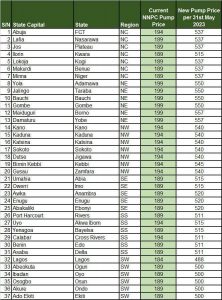Petrol to cost N500 per litre as NNPC increases prices nationwide
May 31, 20231K views0 comments
By Business A.M.
The Nigerian National Petroleum Company Ltd (NNPCL) has effected an upward adjustment in the price of petrol across the country to an average of N500 per litre, following President Bola Tinubu’s declaration to stop fuel subsidy.
NNPC, in a new table of retail prices to be charged across its retail outlets across the country, directed retail managers to take immediate implementation of the prices from May 31 2023,
The price template shows that the cost of petrol has now been adjusted upward from between N184 to N488 in Lagos. Petrol pump price was also raised in other South West states including Oyo, Ogun, Ekiti, Ondo and Osun, from N189 per litre to between N500 per litre.
Read Also:
In Abuja, the price was increased from N194 to N537 per litre. A similar price was issued to other states in the North-Central region including Nasarawa, Plateau, Kwara, Kogi, Benue and Niger where fuel prices stood at N189 prior to the development.
In the North East comprising Adamawa,Bauchi,Borno,Gombe,Taraba, and Yobe, petrol price was increased from N189 to N550 and N557, while for the North-West, it moved fromfrom between N184 and N189 per litre to N515 to N520.
In Abia, Imo, Anambra, Enugu and Ebonyi which make up the South East region, the price was raised Similarly, in the North -West, petrol was increased from N194 per litre to N540.
Similarly, petrol price was raised in the South-South region including Akwa Ibom, Bayelsa,Cross Rivers, Delta,Edo,Rivers States. In the country’s highest petroleum producing region, the price of petrol was raised from the previous range of N189 to N194 per litre to between N511 to N515 per litre.
With the increase in petrol prices nationwide by the national oil company and current sole supplier of petrol in Nigeria, it is expected that other marketers will follow suit and raise their pump prices as well.
This, according to analysts, is an indication that not only is fuel subsidy gone, as announced by the president, but shows that the wasteful price equalization mechanism which ensured petrol had the same official price all over the country is no longer applicable.
Prior to the price increase, NNPC had welcomed the decision of the new administration to cancel petrol subsidy payments.
Mele Kyari, group chief executive officer (GCEO) of NNPCL, in a press statement, explained that the cost of subsidy has been a huge burden on the continued operations of the national oil company.
“We have been funding the subsidy from the cash flow of the NNPC since government is unable to defray the costs of subsidy that is due to the cooperation and we believe that this will free resources for the NNPC to continue to do the great work that this company will do for our country, and it allows us to continue to function as a very commercial entity that will work on this development,” Kyari explained.

